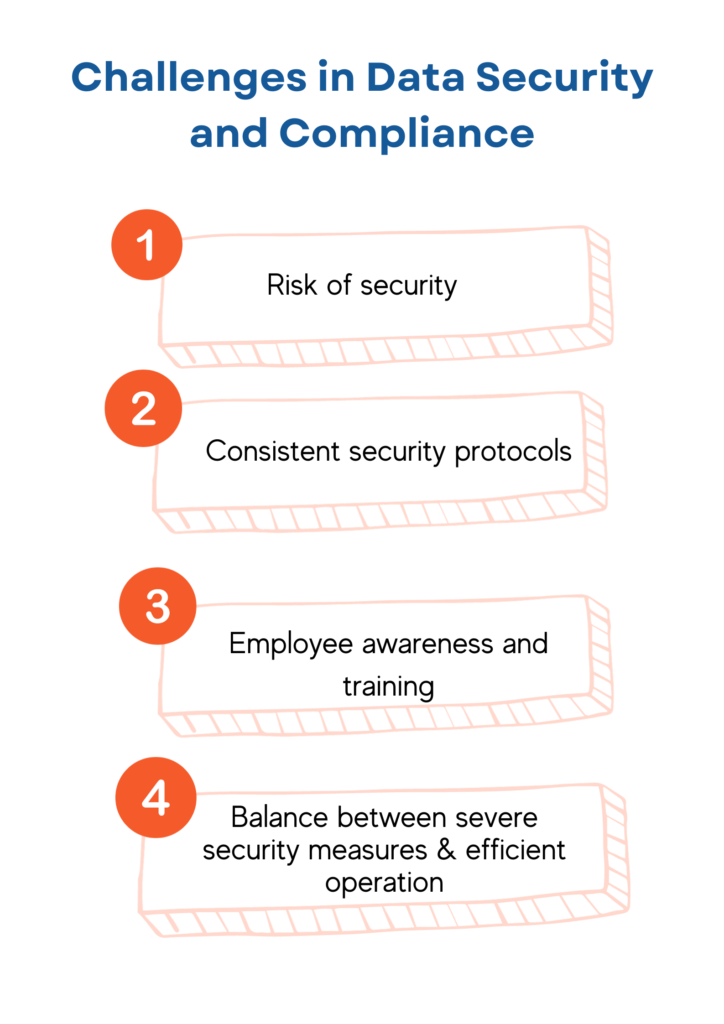Handyman Services List To Simplify Your Business Operations Serveiz |...
Read MoreData Security and Compliance in Field Service Management
Serveiz | Blog
Data security and compliance with sensitive data must be ensured in the fast-paced age of digitization when data is the lifeline of businesses. This is especially relevant in field service management (FSM), where managing vast amounts of data, including customer information and service records, is a daily requirement. This blog explores the complex area of data security and compliance in FSM. By addressing difficulties, laying out recommended practices, analyzing specific instances, and predicting future opportunities, the guide aims to highlight their importance.
Data Security in Field Service Management
Field service management requires effective mobile workforce management to provide services on time and accurately. However, this mobility has a drawback: security breaches are possible because sensitive data is constantly moving. Data breaches have serious consequences, ranging from financial losses and reputational injury to legal penalties. The foundation of any service-oriented firm, client trust, is ruined by security breaches and financial losses. Robust data security procedures build durable relationships by protecting assets and boosting customer trust.
Compliance Regulations in Field Service Management
The General Data Protection Regulation (GDPR) and the Health Insurance Portability and Accountability Act (HIPAA) are only two examples of the complicated regulatory maze for FSM operations to function. Companies handling consumer data or health-related information must strictly follow these laws. Businesses in the FSM must understand and adhere to strict data protection rules since failure to do so could result in significant penalties and legal action.
Challenges in Data Security and Compliance
It can be challenging to manage data security and compliance in FSM. Here are some challenges businesses face while ensuring data security and compliance.
- Mobile workforces that use multiple networks and devices increase the risk of security issues.
- Consistent security protocols across all platforms can be challenging because of the complexity of FSM systems and their integration issues.
- Many data breaches are caused by human error, so employee awareness and training are crucial challenges.
- Finding a balance between severe security measures and efficient operation is another challenge for FSM enterprises.

Best Practices for Data Security and Compliance in FSM
- Secure sensitive data from unauthorized access using robust encryption mechanisms for rest and transit data.
- Implement multi-factor authentication procedures to increase security and ensure only authorized personnel can access the FSM system.
- Establish strict access controls to restrict system access to authorized users, lowering illegal access or data breaches.
- Conduct regular security audits to find systemic flaws and vulnerabilities, enabling prompt security measures assistance.
- Implement comprehensive employee training programs that emphasize compliance and data protection. Well-informed employees are less likely to commit mistakes that could result in breaches.
- Work with technology suppliers who place a high priority on compliance and security standards. FSM operations are strengthened by selecting partners with a solid security focus.
Compliance and Data Security Assurance with Serveiz
Serveiz emerges as the leading provider dedicated to fulfilling your company’s compliance and security needs. Our advanced platform exceeds industry standards, ensuring strong data security and constant regulatory compliance. Serveiz gives organizations the tools to operate safely and securely by providing adaptable compliance solutions, up-to-date encryption, and real-time safety features.
Serveiz ensures clients stay updated on regulatory changes by providing regular updates and continuing support, making FSM operations run smoothly.
Future Trends in Data Security and Compliance for FSM
In the coming years, innovative technologies will play a significant role in data security in FSM. Businesses can use predictive analytics to anticipate security threats and take preventative action. With its capacity to examine massive datasets, artificial intelligence (AI) and machine learning (ML) algorithms can recognize trends and abnormalities, improving security measures. Additionally, it’s essential to keep up with changing laws and standards. For businesses to stay compliant, they must stay on top of changing compliance regulations and be flexible in making the necessary adjustments.
Conclusion
In conclusion, data security and compliance are not mere checkboxes on a to-do list; they are the bedrock upon which reliable and trustworthy Field Service Management stands. Businesses can fortify their FSM operations by investing in robust security measures, staying compliant with regulations, learning from real-life examples, and embracing emerging technologies. In doing so, they protect sensitive information and build a reputation for reliability and integrity, fostering enduring customer relationships. In the dynamic landscape of FSM, adapting to evolving security challenges and regulatory requirements is not just a choice but a necessity. This is for businesses aiming to survive, thrive, and excel.


